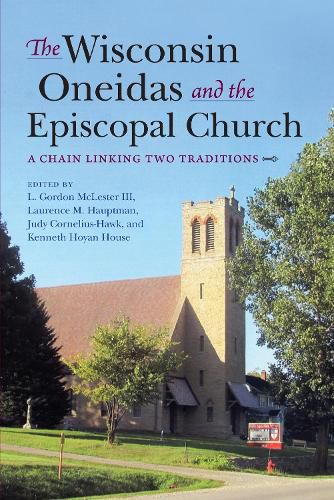Readings Newsletter
Become a Readings Member to make your shopping experience even easier.
Sign in or sign up for free!
You’re not far away from qualifying for FREE standard shipping within Australia
You’ve qualified for FREE standard shipping within Australia
The cart is loading…






This unique collaboration by academic historians, Oneida elders, and Episcopal clergy tells the fascinating story of how the oldest Protestant mission and house of worship in the upper Midwest took root in the Oneida community. Personal bonds that developed between the Episcopal clergy and the Wisconsin Oneidas proved more important than theology in allowing the community to accept the Christian message brought by outsiders. Episcopal bishops and missionaries in Wisconsin were at times defenders of the Oneidas against outside whites attempting to get at their lands and resources. At other times, these clergy initiated projects that the Oneidas saw as beneficial-a school, a hospital, or a lace-making program for Oneida women that provided a source of income and national recognition for their artistry. The clergy incorporated the Episcopal faith into an Iroquoian cultural and religious framework-the Condolence Council ritual-that had a longstanding history among the Six Nations. In turn, the Oneidas modified the very form of the Episcopal faith by using their own language in the Gloria in Excelsis and the Te Deum as well as by employing Oneida in their singing of Christian hymns.
Christianity continues to have real meaning for many American Indians. The Wisconsin Oneidas and the Episcopal Church testifies to the power and legacy of that relationship.
$9.00 standard shipping within Australia
FREE standard shipping within Australia for orders over $100.00
Express & International shipping calculated at checkout
This unique collaboration by academic historians, Oneida elders, and Episcopal clergy tells the fascinating story of how the oldest Protestant mission and house of worship in the upper Midwest took root in the Oneida community. Personal bonds that developed between the Episcopal clergy and the Wisconsin Oneidas proved more important than theology in allowing the community to accept the Christian message brought by outsiders. Episcopal bishops and missionaries in Wisconsin were at times defenders of the Oneidas against outside whites attempting to get at their lands and resources. At other times, these clergy initiated projects that the Oneidas saw as beneficial-a school, a hospital, or a lace-making program for Oneida women that provided a source of income and national recognition for their artistry. The clergy incorporated the Episcopal faith into an Iroquoian cultural and religious framework-the Condolence Council ritual-that had a longstanding history among the Six Nations. In turn, the Oneidas modified the very form of the Episcopal faith by using their own language in the Gloria in Excelsis and the Te Deum as well as by employing Oneida in their singing of Christian hymns.
Christianity continues to have real meaning for many American Indians. The Wisconsin Oneidas and the Episcopal Church testifies to the power and legacy of that relationship.